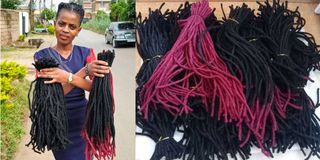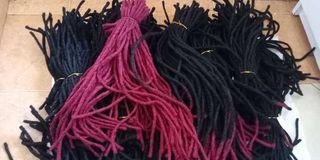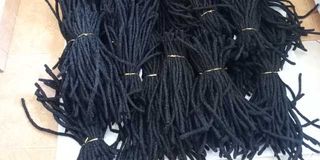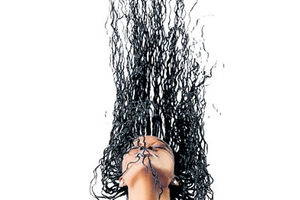
Beatrice Njeri, pictured in Kibera, Nairobi, on January 6, 2025. She is the founder of Mobylocs, a venture dedicated to upcycling synthetic hair waste into sustainable, Afro-centric dreadlocks.
Sustainability is impacting even the most unlikely sectors of the retail industry. Synthetic hair, once seen as a one-time-use product, is finding a new purpose.
The synthetic wigs, weaves, and extensions that once adorned the heads of fashion-conscious women are now taking on a second life, and Beatrice Njeri, an entrepreneur in this space, has made a business out of it.
Having worked as a hairdresser and beautician, she witnessed the environmental challenge posed by synthetic hair waste, often discarded in landfills or openly burned, releasing harmful greenhouse gases.
This firsthand experience inspired her to take action, leading to the creation of Mobylocs, a social enterprise dedicated to upcycling synthetic hair waste into sustainable, Afrocentric dreadlocks.
Her journey has been centred on finding solutions to environmental problems while making a positive impact, with her company tackling synthetic hair waste through innovative, eco-friendly solutions.
“I founded the business out of curiosity, professional experience, and a deep desire to create a solution to an environmental problem that had long been overlooked in Kenya,” she says.
For over 10 years, Ms Njeri worked as a hairdresser and beautician, gaining technical expertise and a deep understanding of the beauty industry’s inner workings. She explains that daily, she styled clients’ hair using synthetic hair extensions, weaves, and braids, products that dominate the beauty industry in Kenya due to their versatility and affordability. However, while enhancing her clients’ confidence and self-expression, she could not help but notice the growing problem of synthetic hair waste.

The Mobylocs product line was inspired by Njeri's desire to find a solution to the waste she saw daily while working as a hairdresser.
“The synthetic hair we used had a short lifespan, and once it had served its purpose, it was often carelessly discarded. By the end of each day, piles of synthetic hair waste would accumulate in the salon. At first, I did not give much thought to where the waste went once it left the salon,” she says
She adds that over time, she began to notice how the waste clogged drainage systems, polluted streets, and was frequently burned in the open air, releasing toxic fumes into the environment, an issue so widespread that it became impossible to ignore.
She reflected on the problem and became deeply troubled. Synthetic hair is made from plastic-based materials that are non-biodegradable, meaning they take hundreds of years to break down, yet the beauty industry in Kenya and across the world continues to generate massive amounts of this waste, with no systems in place to manage it responsibly.
At the same time, she observed a growing awareness of environmental sustainability. Conversations about waste management and recycling were becoming more common, but the beauty industry seemed to lag.
There was a clear discrepancy between the industry's glitzy reputation and its effects on the environment. She realised that something had to be different and saw a business opportunity that could be leveraged.
One of her biggest challenges was convincing people of the importance of addressing synthetic hair waste, and she dedicated many hours to educating salon owners and beauticians about the waste's environmental effects, its inability to biodegrade, and the harmful emissions from burning it.
The inspiration to start the enterprise stemmed from her desire to provide an environmentally responsible solution that also celebrates African culture. As a hairdresser, she worked with countless clients who viewed their hair as a powerful form of self-expression and cultural identity.
She sought to create a product that would allow them to embrace their heritage while contributing to a more sustainable future.
“The concept of upcycling synthetic hair waste into eco-friendly dreadlocks emerged from a desire to combine sustainability with cultural pride. Dreadlocks, deeply tied to African culture and history, represent pride, resilience, and a connection to one's roots,” she says.

Mobylocs.
Ms Njeri acknowledges the challenges of turning her idea into reality. She began experimenting with synthetic hair waste to determine if it could be transformed into a durable, high-quality product.
After months of research, trial, and error, she developed a process for cleaning, disinfecting, and reengineering synthetic hair waste into Afrocentric dreadlocks. Every step of the process was designed with sustainability in mind, from sourcing materials to creating a final product that could be reused multiple times.
Starting with personal savings of Sh200,000, she was able to establish the business, though it was barely enough to set up a small workspace and begin the upcycling process.
As Mobylocs began to take shape, she secured grants from programs like the Give Work Challenge, 54 Collectives, and the Leading Change African Blueprint Program (L-CAP). These grants played a crucial role in scaling operations, buying better equipment, and hiring skilled artisans.
Determined to set herself apart from traditional beauty businesses, she focused not only on selling products but also on creating a movement.
"Our mission is to redefine beauty in a way that prioritises sustainability, community empowerment, and cultural expression," she says.
She engages consumers to raise awareness about the environmental impact of synthetic hair waste and the advantages of choosing sustainable alternatives. Through workshops and online campaigns, they aim to inspire a shift toward more eco-conscious choices within the beauty industry.
The enterprise partners with salons across Kenya to source synthetic hair waste, helping to reduce waste at the source. The collected hair is sorted, carefully cleaned and disinfected using eco-friendly methods to ensure safety and hygiene.
Today, the company employs 15 women and 15 young artisans who are dedicated to bringing the vision to life. These skilled artisans handcraft lightweight, durable, and stylish Afrocentric dreadlocks while benefiting from fair wages and skills training, promoting economic empowerment within the community.
She is encouraged by the growing momentum around sustainability in the beauty and fashion industries, noting a shift where consumers increasingly demand transparency and accountability from brands. Terms like upcycling, circular economy, and eco-friendly are no longer niche but are becoming mainstream. However, she points out that a lot of work remains to be done, as many companies use sustainability as a marketing gimmick without making meaningful changes to their operations.
“We aim to set a higher standard by demonstrating that true sustainability is possible when businesses are willing to innovate and invest in solutions that benefit both people and the planet. I see our business playing a leading role in the movement toward sustainable beauty,” she says.
The enterprise plans to expand its product line to include other upcycled beauty and fashion items, such as accessories made from synthetic hair waste.
The Afrocentric locks range from Sh3,500 to Sh12,000. Although these prices may be higher than mass-produced alternatives, she says the products offer long-term value through durability and reusability.
Balancing the cost of sustainability with affordability remains a challenge, but strategies like optimising production and sourcing cost-effective materials help. The company also educates consumers on the true value of sustainable products.
She hopes to establish the brand as a global leader that inspires other businesses to prioritise sustainability. Ms Njeri says she is on a mission to demonstrate that waste can be turned into value, hoping to inspire other entrepreneurs to think creatively about the challenges society faces.










